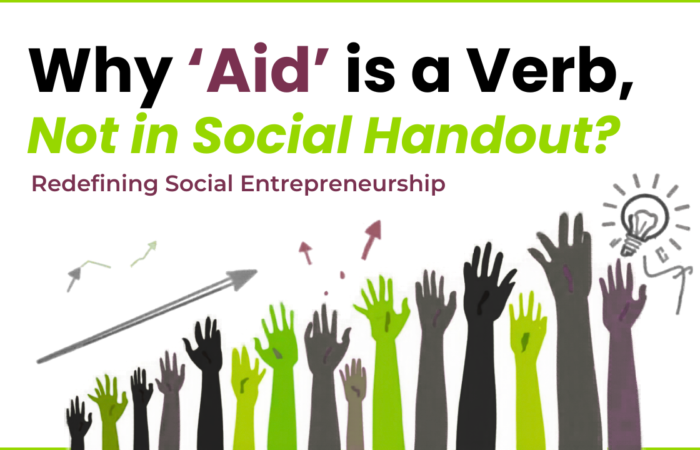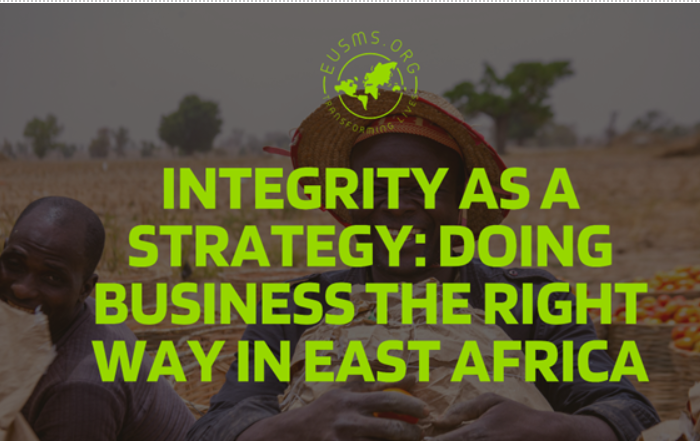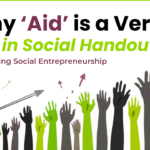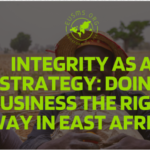For decades, the formal education system has been the foundation of the knowledge economy, providing a critical understanding of theory and subject expertise. However, its core focus on academic rigor often means that aspiring entrepreneurs must seek out additional resources to acquire the essential, practical skills required to launch a viable business. This difference in focus between the academic theory of the lecture hall and the hands-on demands of the market has created a crucial opening for a new kind of institution: the cultural innovation hub.
What is the Innovation Hub?
An innovation hub (or simply the hub) is a physical or virtual space designed to foster collaboration and creativity, acting as a central nervous system for the startup ecosystem.
Unlike a traditional academic department, the hub is explicitly market-driven and focuses on rapid idea transformation. It is not a place for theory; it’s a dedicated workshop for making an idea into a viable business.
The hub typically functions through three core elements:
- The Space: It provides specialized facilities like co-working desks, makerspaces, and high-speed internet, the infrastructure a young startup needs but cannot afford.
- The Programming: It runs structured programs (incubators and accelerators) that put ideas through intense development cycles focused on product-market fit and commercial viability.
- The Network: It acts as a nexus bringing together the diverse stakeholders, founders, mentors, investors, and corporate partners, creating a rich ecosystem for knowledge and capital transfer.
By providing this practical, high-velocity environment, the hub directly addresses the skill gaps left by the university, forming the crucial link that moves an innovative concept from a paper thesis to a funded company.
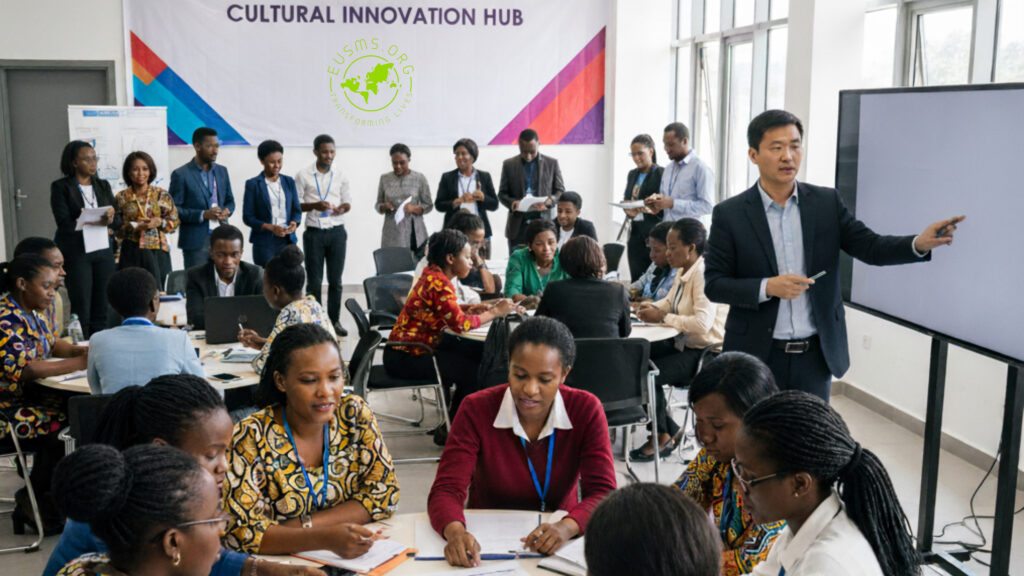
- Filling the Gap: Culturally-Informed Skills for Global Trade
Where the university provides the strong foundational knowledge, the cultural innovation hub provides the globally-aware launchpad. Hubs deliver experiential learning and specific tools necessary to navigate the complex journey of the early-stage startup in an international context.
- Global Market Access: The hub’s focus extends beyond a local economy, providing culturally specific knowledge, such as language skills and market nuances, essential for businesses seeking to scale internationally.
- Cultural Entrepreneurship: Hub programs offer targeted training in areas often outside of core academic curricula, helping founders master the pitch that respects cultural differences, execute marketing campaigns that resonate across borders, and understand the legal intricacies of bilateral business compliance.
- The Intercultural Mindset: Hubs cultivate a culture that encourages participants to see cultural diversity as a core asset, fostering the adaptability and resilience required to succeed in global trade and cross-border ventures.
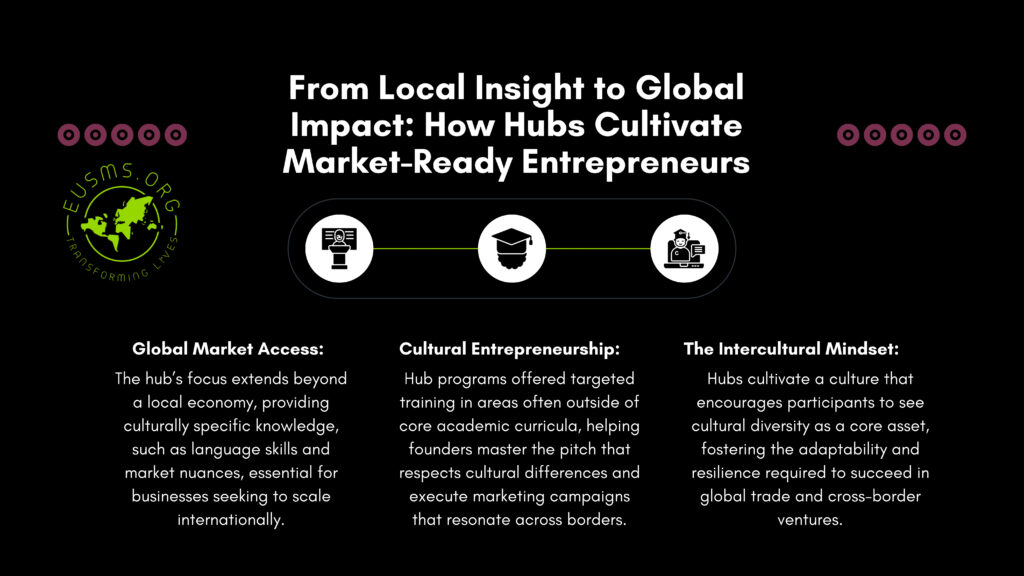
- Linking Local Innovation to EUSMS: A Partnership for Transformative Change
The greatest impact of a cultural innovation hub is its ability to create pathways for collaboration with established international partners, particularly with organizations like EUSMS, an organization in Munich dedicated to making a profound impact in Kenya, East Africa, and beyond.
- A Shared Mission for Empowerment: EUSMS is a passionate team of change-makers dedicated to driving transformative change and empowering people and communities through collaboration, compassion, and innovation. Their belief that every helping hand can spark a brighter, more equitable future perfectly aligns with the hub’s mission of empowering local talent.
- Complementary Strengths: EUSMS seeks innovative solutions and partnerships to expand their impact and support their mission. Meanwhile, local Tanzanian startups offer agility, deep market insight, and disruptive tech solutions that can be leveraged to create lasting improvements and ignite hope across the region.
- A Trusted Channel for Impact: The hub acts as a trusted channel for organizations like EUSMS, providing a vetted environment for forging partnerships and engaging in pilot projects. This ensures EUSMS can access specialized talent and innovative solutions that are compliant, market-ready, and aligned with their core mission to empower people and communities.
- A Real-World Example: UDSM Confucius Centre
The recent workshop held in partnership with the University of Dar es Salaam (UDSM) Confucius Centre perfectly exemplified this model. The event, with its focus on practical skills like legal compliance, demonstrated a crucial trend in the Tanzanian innovation ecosystem: the professionalizing of the startup sector through international and cultural collaboration. The inclusion of women’s rights and empowerment also aligned the academic institution’s mission with the social and economic goals of the ecosystem.
From engaging discussions on innovation and women’s rights to practical sessions on legal issues, compliance, and entrepreneurship, this workshop was a true hub of ideas and collaboration.
Concluding Thoughts and Call to Action
The University-Hub relationship is rapidly evolving into a cooperative bridge, with institutions like the University of Dar es Salaam stepping up as crucial partners. The success of the recent workshop was a powerful testament to this new model of cultural and entrepreneurial education.
🤝 Join the Next Wave of Global Innovators!
We will have more events focused on building essential entrepreneurial skills and networking opportunities.
Follow us on our social channels to be the first to know when the next workshop is announced. Together, we continue to transform lives through entrepreneurship, innovation, and empowerment.
Author: Tina Paredes

